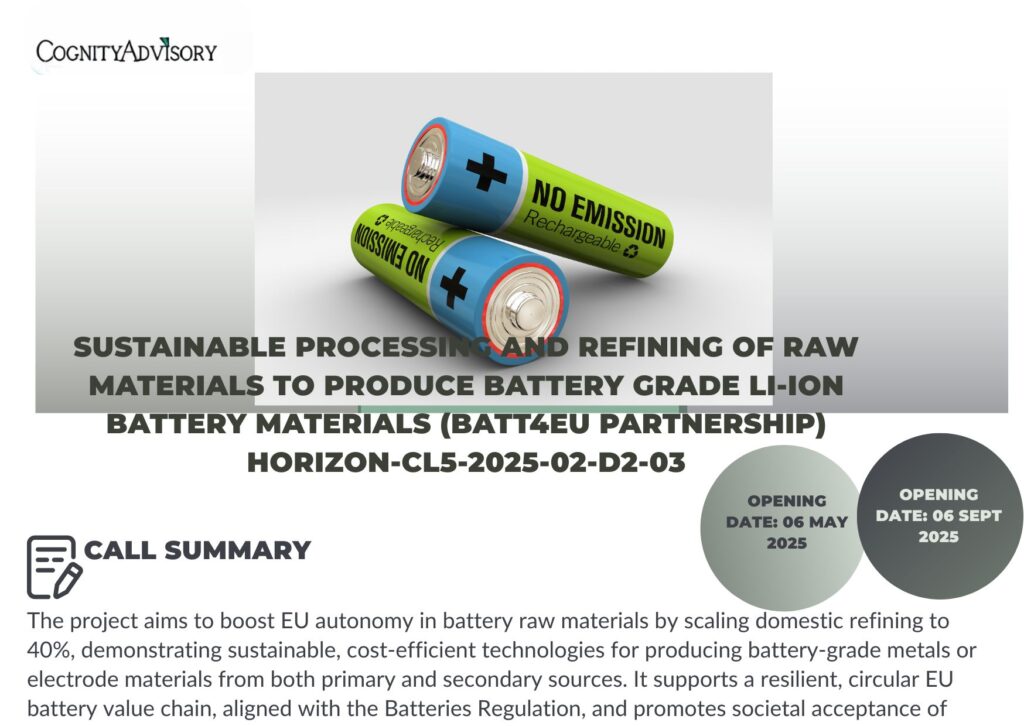HORIZON-CL5-2025-02-D2-03
General information
Programme
Horizon Europe (HORIZON)
Call
Cluster 5 Call 02-2025 (WP 2025) (HORIZON-CL5-2025-02)
Type of action
HORIZON-IA HORIZON Innovation Actions
Type of MGA
HORIZON Lump Sum Grant [HORIZON-AG-LS]
Open For Submission
Deadline model
single-stage
Opening date
06 May 2025
Deadline date
02 September 2025 17:00:00 Brussels timeTopic description
Expected Outcome:
Project results are expected to contribute to all of the following outcomes:
- Increased autonomy for the EU in the battery raw materials sector, with a focus on creating new business models and opportunities within a strengthened battery value chain;
- Increased processing and refining capacities of battery raw materials, contributing to the target of 40% of domestic processing capacity in the EU for Strategic Raw Materials[1];
- Advanced technologies for the processing of primary and secondary raw materials into high-quality battery metals or active materials are demonstrated, emphasising operational feasibility;
- Sustainability, efficiency, and resilience of the European Li-ion battery sector is significantly increased by adopting innovative refining and processing solutions;
- Circular battery value chains within EU are promoted by expanding the European refining capacity for secondary streams and implementing the objectives of the Batteries Regulation[2];
- Improved societal acceptance and benefits of processing plants.
Scope:
Projects are expected to demonstrate the cost-efficient, safe and sustainable production of at least one of the following final products:
- Battery-grade metals and precursors;
- Electrode active materials.
Raw materials in the scope are limited to lithium, cobalt, graphite, nickel, manganese and phosphorus.
The proposed processes need to be ready for large-scale adoption, using at least one of the following source materials:
- Primary: Refining of raw materials sourced from ores, brine, or other mineral-bearing resources, using processes tailored to raw materials originating from the EU (or countries associated to Horizon Europe);
- Secondary, such as mining waste, tailings, sludges and slags (for Ni, Co), intermediate products of end-of-life processes (e.g., black mass), manufacturing scraps, and wastewater from processing.
Mining and mechanical recycling processes of battery cells, modules and packs are out of scope for this topic. The use of waste batteries and battery manufacturing waste which require mechanical (pre-)treatment is also out of scope.
Integration of produced electrode materials into cell production is out of scope, but validation of functionality and quality of the processed materials is within the scope.
Whenever the expected exploitation of project results entails developing, creating, manufacturing and marketing a product or process, or in creating and providing a service, the plan for the exploitation and dissemination of results must include a strategy for such exploitation. The exploitation plans are expected to include preliminary plans for scalability, commercialisation, and deployment (feasibility study, business plan) indicating the possible funding sources to be potentially used (in particular the Innovation Fund).
Proposals are expected to evaluate the social acceptance of the proposed sustainable business models, by consulting and involving actors directly affected by the planned processing activities. Proposals should demonstrate the potential of the proposed solutions to reduce environmental and social barriers to the deployment of new production facilities.
The Commission initiative for Safe and Sustainable by Design[3] (SSbD) sets a framework for assessing the safety and sustainability of chemicals and materials which should be considered as a reference for project proposals.
Proposals could consider the involvement of the European Commission’s Joint Research Centre (JRC) whose contribution could consists of providing added value regarding various aspects of battery sustainability, considering in particular provisions of the 2023/1542 battery regulation. For further information on the JRC’s possible contribution to the projects, please, search for additional publicly available information on the JRC’s website (EU Science Hub) on the NCP portal, or request specific information from the JRC (JRC-NCP-Network@ec.europa.eu)
JRC shall assure that all the other applicants receive the same information on the JRC’s possible contribution to the project (e.g., via the topic-specific FAQs under the Funding and Tenders Portal).
Projects are expected to collaborate and contribute to the activities of the Coordination and Support Action defined under the topic HORIZON-CL5-2025-D2-02-06.
This topic implements the co-programmed European Partnership on Batteries (Batt4EU). As such, projects resulting from this topic will be expected to report on the results to the European Partnership on Batteries (Batt4EU) in support of the monitoring of its KPIs.
[1] Regulation (EU) 2024/1252 of the European Parliament and of the Council of 11 April 2024 establishing a framework for ensuring a secure and sustainable supply of critical raw materials and amending Regulations (EU) No 168/2013, (EU) 2018/858, (EU) 2018/1724 and (EU) 2019/1020 (OJ L, 2024/1252, 3.5.2024, ELI:
